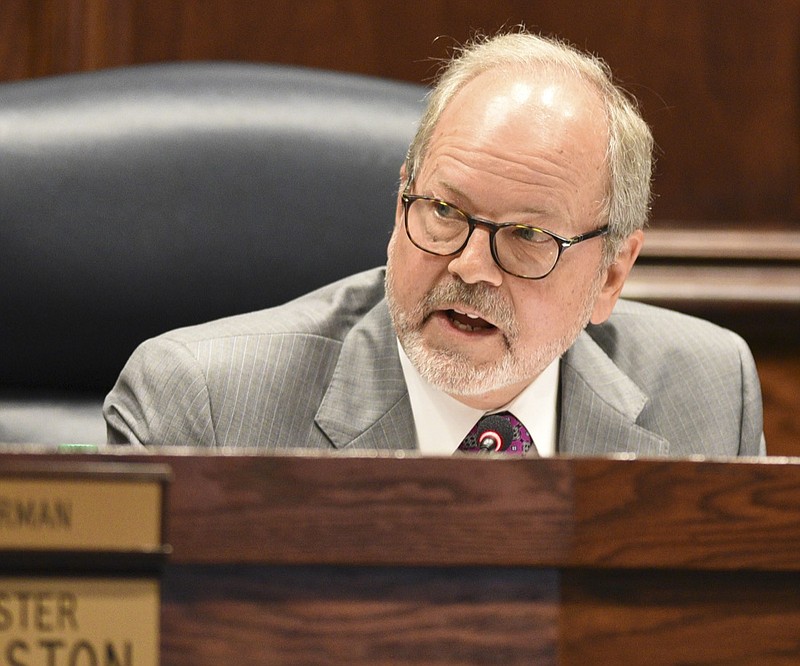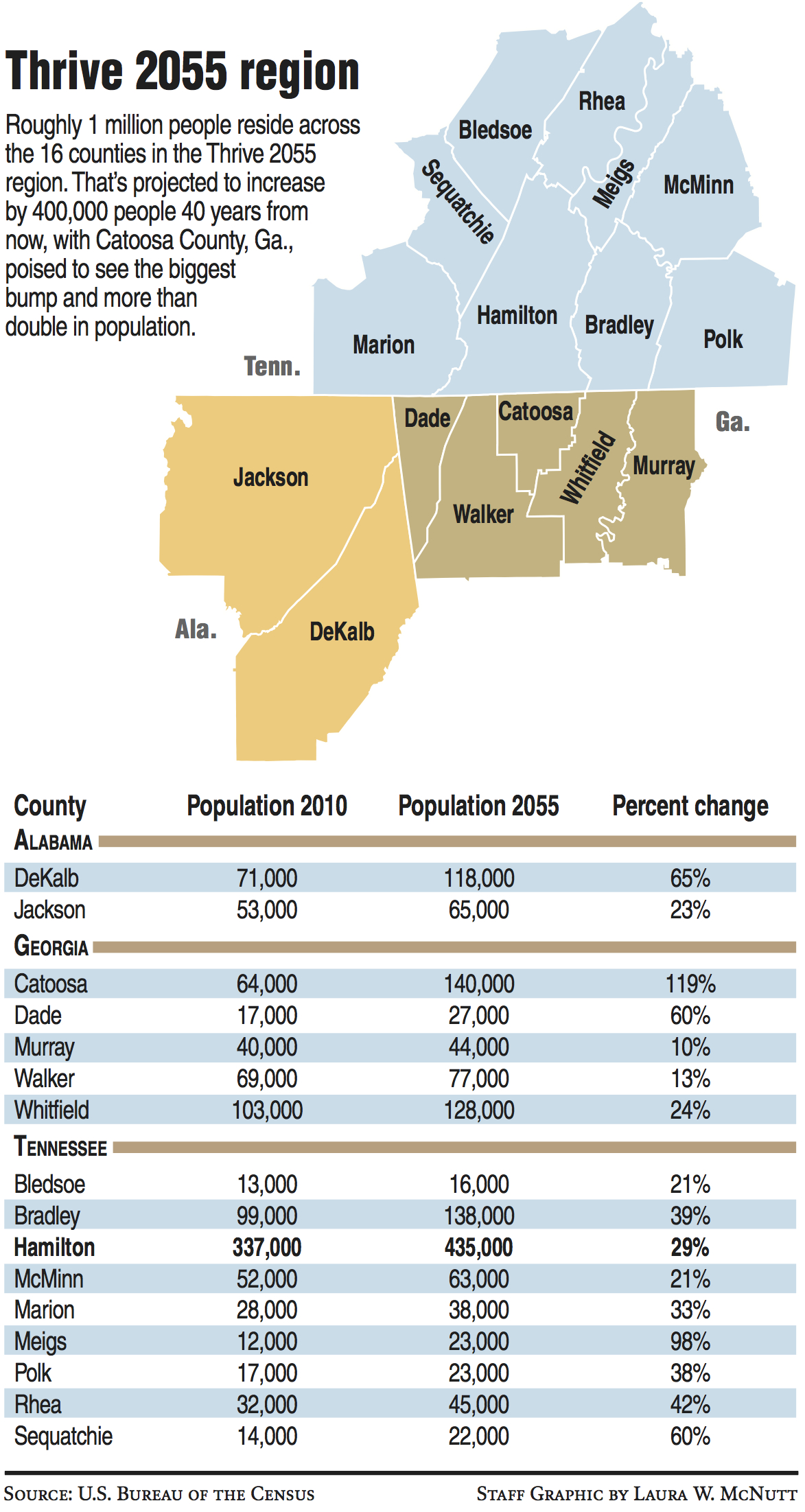Hamilton County commissioners on Wednesday voted to commit $300,000 over three years to a 16-county, three-state partnership looking for regional answers to transportation, conservation and economic development issues.
The tri-state region of Tennessee, Georgia and Alabama is home to a million people with interlinked cultures and economies but no strong tradition of working together, Thrive Regional Partnership President and CEO Bridgett Massengill told commissioners last week while pitching the funding request.
Thrive was founded to create a 40-year plan to leverage the strengths of the participating counties to benefit the entire region.
"We needed to begin conversations with neighbors we'd never had conversations with before," Massengill said. "We discovered there was no entity keeping an eye on the footprint for how we were working together as a region."
THRIVE 2055
Thrive Regional Partnership:› 40-year growth plan› 3 states, 16 counties› 1 million people› 79 municipalities› 6,648 square milesSource: Thrive 2055
A 2014 survey found residents' priorities were twofold: a humming economy and preservation of the environment, the Times Free Press previously reported.
A big part of the economic focus deals with transportation. For instance, Massengill said, 44 percent of Hamilton County's workers commute from outside the county. That means they need dependable ways to come and go.
Many of their jobs - about 22 percent, Mayor Jim Coppinger said - are involved in manufacturing, such as the Volkswagen plant and its suppliers, Wacker Chemie in Bradley County, another cluster of automotive suppliers in McMinn County, and others. Most of those plants are served by road and rail, both overburdened.
Massengill said the No. 1 freight gridlock in Tennessee is the Interstate 24-75 interchange, where "80 percent of the truck traffic through it isn't starting or stopping here, but is putting wear and tear on our roads and infrastructure."
That sparked talk about a Chattanooga bypass, a long-discussed but still-ephemeral idea to link interstates 59, 24 and 75 and keep trucks out of the city.
And congestion will only get worse with the recent opening of the Appalachian Regional Port in Murray County, Georgia. That's expected to move 50,000 loads from rail to truck in a year, she said, "but there's no talk about where it goes."
Commissioners last week and Wednesday asked few questions about Thrive's mission but many about its funding. The organization was founded in 2012 with support from Hamilton County and Chattanooga and just last year emerged as a stand-alone entity. Its $700,000 budget comes from its member counties and cities, some federal dollars and significant support from the Lyndhurst Foundation.
Commissioner Tim Boyd, who has positioned himself as a spending watchdog on the commission, spoke at length about his frustration that Massengill didn't provide a line-item budget or a description of how the public's money would be spent.
"I'm really struggling to try to justify this one," Boyd said. "Every county department gives us a line-item budget. I'm frankly very tired of nonprofits coming to this commission asking for hundred of thousands or millions of public money without saying how the money's being used."
He and other commissioners also were unhappy that Thrive's request wasn't included in the 2019 budget that took effect July 1. That will mean amending the budget and taking the first-year commitment of $100,000 out of reserves.
"This resolution has given me a little indigestion, just because we're going into the fund balance, but I'm going to act in good faith because the mayor supports it," Chairman Sabrena Smedley said.
Coppinger explained that Thrive had begun talks with his office in January or early February, but the county was waiting on the city of Chattanooga to put up its own share. Chattanooga City Council Chairman Ken Smith, who attended the commission meeting, said that didn't happen until early July.
Coppinger also noted the size of the $92 million reserve fund and said he expects the $100,000 will come from unspent monies rather than drawing down the bank balance.
"What Thrive is doing is providing a service, much like the chamber does with economic development or the Humane Society when we talk about what we do with our animals," Coppinger said.
Boyd said he would vote to give Thrive the money if fellow commissioners would amend the resolution and add an extra $100,000 for the Bookworm program operated by Girls Inc. that he has long supported. Only he and Commissioner David Sharpe voted for the amendment.
Then commissioners passed the Thrive funding 6-2, with Boyd and Commissioner Katherlyn Geter voting against. Commissioner Warren Mackey was absent.
Also Wednesday, commissioners:
» Heard a presentation by Geter commending Charles Lowery Sr., who is retiring from the Hamilton County Sheriff's Office after 41 years.
» Approved a definition of "household animals" in residential areas. Regional Planning Agency Executive Director John Bridger said the definition would be helpful with enforcement if there are complaints about animals running loose. The resolution lists dogs, cats, birds, rodents, fish or reptiles usually kept for pleasure and enjoyment in a household, and specifies that such animals are restrained by leash, cage or fencing.
» Noted that Thursday is the deadline for applications for an open judicial commissioner position. Interviews for the job will be held Sept. 26 at 1 p.m.
Contact staff writer Judy Walton at jwalton@timesfreepress.com or 423-757-6416.

